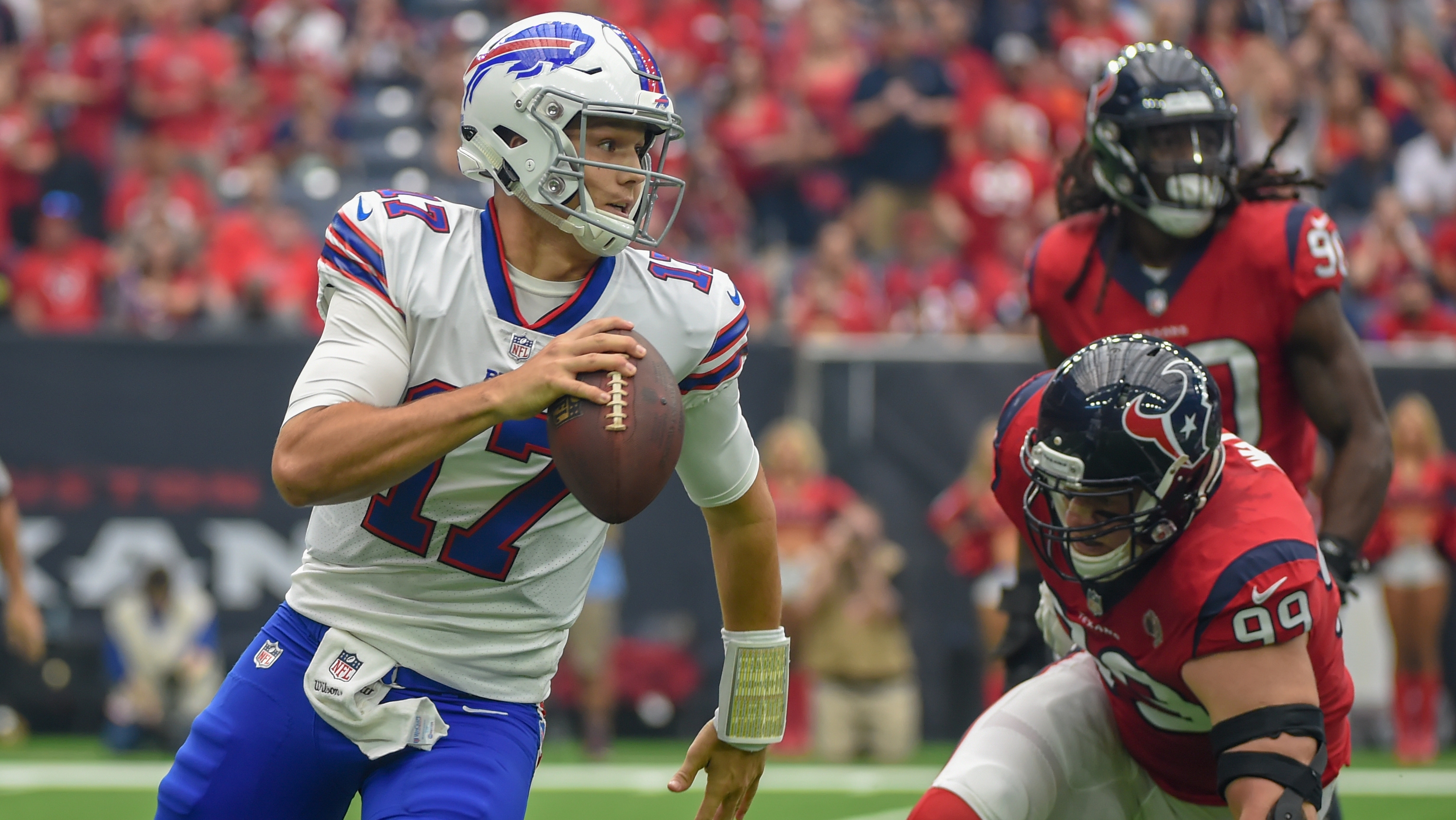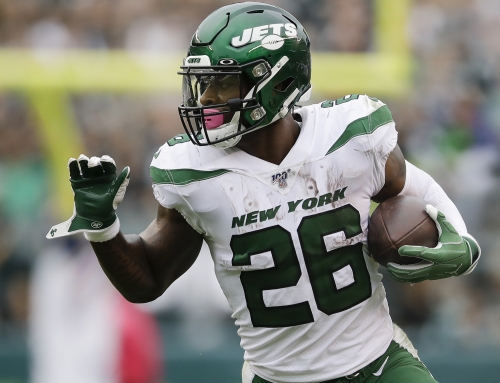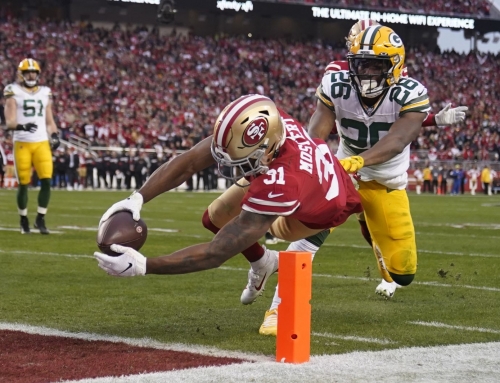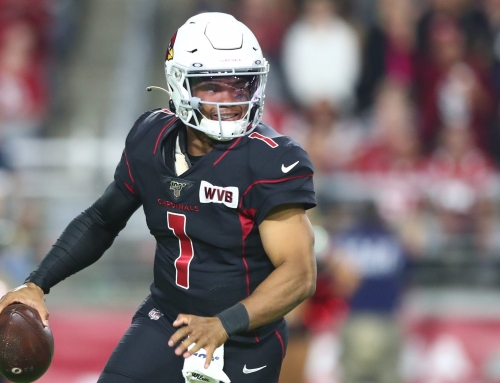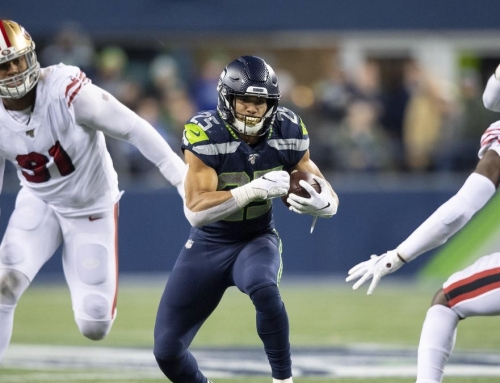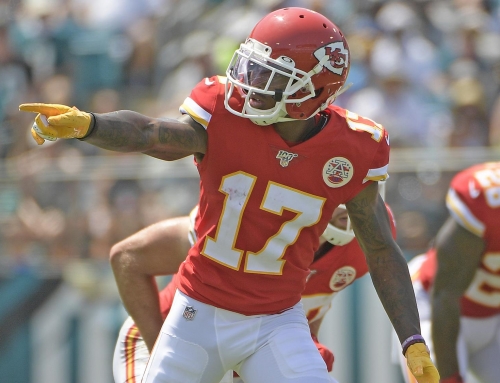Carson Palmer recently proclaimed that in a few years, people will be saying that Josh Allen should’ve been the first pick in the 2018 NFL Draft over Baker Mayfield, over Saquon Barkley, over Sam Darnold, and over any other player.
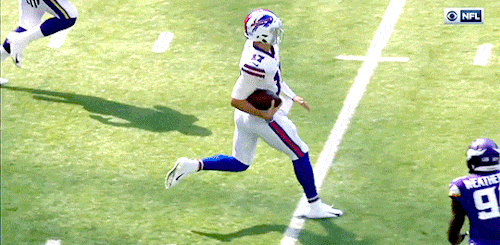
Photo Credit: gfycat.com and NFL
It’s easy to understand why he said that. The kid is a freak athlete. And yet, dynasty and NFL pundits alike seem to be split on Allen. You either love him, or you hate him. Accuracy is an issue, but his rushing production racks up fantasy points. We hear things said about Allen like “best arm strength in the league”, but then we see his 52.8% completion percentage on 320 attempts and shudder. We love his speed rushing abilities but worry about his long-term health given that running the ball is such a big part of his game.
Fans say that Allen is the new Cam Newton. Critics say that he is more like the next Tim Tebow. But which side is right? In terms of pure size, Allen is a big dude. He’s listed as 6’5, 237 pounds and looks every bit of it. He is one of the biggest quarterbacks the league has seen in the last 10 years. Allen is bigger than Tebow was during his NFL career, and Newton is a more apt comparison when discussing quarterback body size. Still, in October, he sprained his right elbow and missed four games, as even the biggest players will inevitably take punishing hits. It’s important to note, however, that the injury occurred on a pass play in the pocket after the ball was thrown. Allen’s critics worry about him getting hurt while running the football, but that has yet to happen since his first start. Similarly, Newton has played 130 games thus far in his career, and despite averaging 116 rushing attempts per season, he has only missed five games total. Allen rushed the ball 89 times during his rookie season and wasn’t injured on any of those plays. Here’s a live look at Allen scrambling for a first down:
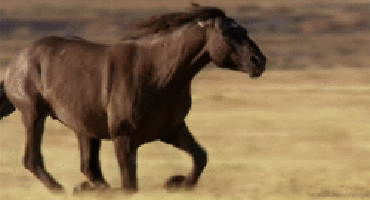
Photo Credit: giphy.com
I think Allen’s frame and size should alleviate injury concerns. While injuries are difficult to predict, the risk seems lessened for a quarterback of his size who will still spend his time primarily in the pocket, unlike Baltimore’s usage of Lamar Jackson during his rookie season. Jackson averaged 17.0 rushing attempts per game in his seven starts, whereas Allen averaged just 7.7 rushing attempts per game in his 11 starts. Allen will be taught to avoid contact and protect his body at the end of his runs, and you can see from the graph below that he is one of the biggest quarterback prospects in the last decade.
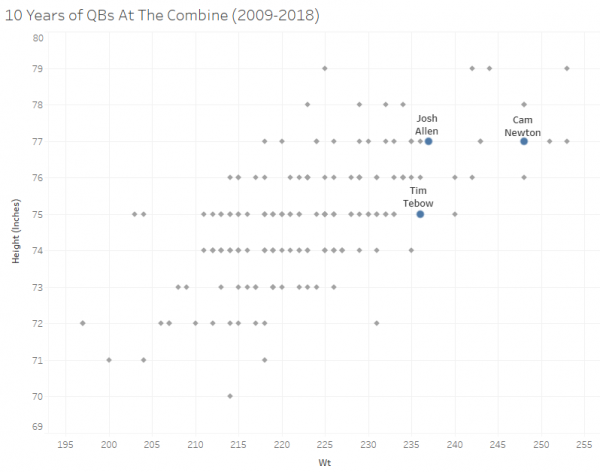
Photo Credit: Johnny Newbern / Sam Fife
Since size and durability aren’t a pressing concern given Allen’s physical abilities and measurements, let’s focus and analyzing Allen’s passing abilities and intangibles compared to those of Newton and Tebow.
The Next Cam?
Was the Allen we saw in Week 17 against Miami the real Allen? The rookie went 17 for 26 (65.4% completion rate) with three touchdowns and one interception in a 42-17 win over the Dolphins. Not a bad day passing the ball. But don’t forget that he also ran nine times for 95 yards and added two touchdowns on the ground. We obviously can’t expect that kind of production every week, but anything close to it would make Allen an elite fantasy quarterback, maybe even enough to dethrone Patrick Mahomes. By the way, Allen won AFC Offensive Player of the Week for that Week 17 performance, the first Bills quarterback to accomplish that since Drew Bledsoe did it in 2002. This performance certainly inspires hope that Allen could be the next Cam Newton.
Accuracy & Arm Strength
Allen completed 56.2% of his passes during his college career at Wyoming, and that was against Mountain West competition. Not great. Pair that with his NFL rookie season (52.8% completion rate), and we get what appears to be an inaccurate passer. Will that improve? History says that it should…a bit. Jared Goff had a 54.6% completion percentage in his rookie season, which jumped to 62.1% in his second year. Mitch Trubisky completed 59.4% of his passes during his rookie season but improved to a 66.6% completion rate in his second year. While both Goff and Trubisky benefited from offensive-minded coaching hires between their first and second seasons, it’s still very possible for Allen to improve despite a lack of coaching changes.
Even if Allen doesn’t drastically improve, Newton’s career completion percentage in Carolina is just 59.7%, and if Allen can get his numbers in that ballpark while maintaining his rushing output, he is going to be just fine. Keep in mind too that Allen was throwing to the likes of Zay Jones and Robert Foster. His safety blanket tight end, supposedly a rookie quarterback’s best friend, was Charles Clay, an aging veteran who finished the season with just 21 catches for 184 yards. There was little supporting talent on the offense for Allen to work with, and assuming that the Bills invest in play-makers this coming offseason, it stands to reason that Allen’s completion rate should improve.
On the other hand, Allen’s arm strength isn’t ever going to be an issue. Allen makes throws mortals just can’t make and has been doing so since college. Check out this throw made below while he was running to his left…my goodness. It traveled well over 50 yards in the air travel and was on the money.
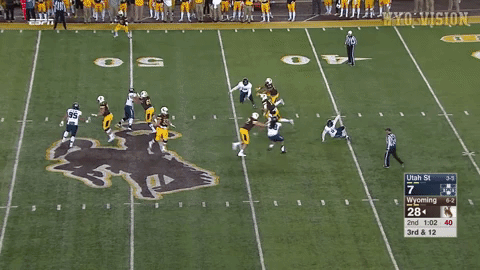
Photo Credit: WyoVision
Remember that the Bills have a slew of draft picks and $90 million dollars in cap space going into the offseason. An entire offseason of NFL-caliber coaching will also benefit Allen, who will be working with David Culley as his quarterbacks coach, a 25-year coaching veteran who has his sights set on fixing Allen’s footwork. This should all be music to Allen’s dynasty owners’ ears. Rest assured that Buffalo is going to do everything they can to make Allen a better passer and overall quarterback.
Intangibles / Draft Capital
The Panthers knew that they were getting an on-the-field leader when they drafted Newton first overall. Allen doesn’t have that same college track record, but it’s fair to say that he overachieved in his rookie year by most people’s standards given the sentiments in Buffalo this offseason. The team is playing with swagger and confidence with Allen under center after trading up from the 12th overall pick to the seventh overall pick to grab their (possibly franchise) quarterback. Allen has shown plenty of leadership qualities already, and Buffalo is going to do everything they can to put him in a position to succeed.
The Next Tebow?
The flip side of the coin to Allen’s stunningly amazing Week 17 win over Miami was Allen’s Week 16 performance against New England. To be fair, this game was played in Foxborough, and Bill Belichick eats rookie quarterbacks for breakfast. However, it doesn’t change the fact that Allen threw a miserable 20 for 41 (48.8%) for 217 yards, one touchdown, and two interceptions. His legs didn’t bail him out this either, with the Patriots defense limiting his rushing to just 5 runs for 30 yards. It was not a good showing for the rookie, and it’s one that many critics will point to when comparing him to Tim Tebow.
Accuracy / Arm Strength
Tebow only made it three seasons in the NFL before he was deemed to be unemployable, and only two of these seasons were as a quarterback while with the Broncos. His final season in the league, Tebow served a hybrid fullback / tight end while with the Jets. This was largely due to the way he throws the football. Tebow’s mechanics were poor, and in his one true season as a starting quarterback in 2011, he completed only 45.5% of his passes. Allen already has that number beat as a rookie, and just watching film of the two quarterbacks throwing the ball should make it clear for just about anyone that Allen’s mechanics as a passer are far superior. If his 52% completion percentage (last in the NFL this season) doesn’t improve, then Allen’s career could have a Tebow-like fate eventually, but he’s certainly already off to a much better start with reason to think that he can improve.
Intangibles / Draft Capital
The story was a bit different with Tebow in Denver than it is with Allen in Buffalo. Even on that magical playoff run, Broncos fans were split on Tebow as their quarterback of the future. Despite the leadership intangibles and the college pedigree, Denver drafted Tebow very late in the first round of the 2010 NFL Draft with the 25th overall pick. There were already major concerns about his abilities as a passer, and after failing to show any signs of improvement during his two seasons in Denver, it was quickly all she wrote for Tebow. I just don’t see the same thing happening to Allen in Buffalo barring a complete lack of improvement.
Remember that Allen isn’t jumping into the NFL from an established college program like Florida or Auburn, which Newton and Tebow had the benefit of doing. Allen came from Wyoming, so a steeper learning curve for him should’ve been expected in his rookie year. When comparing only the passing statistics from Allen’s first 12 career games to the first 12 games of Newton and Tebow’s careers, you see that learning curve kick into gear in the second half of the season for Allen, with his play trending much closer to that of Newton rather than that of Tebow.
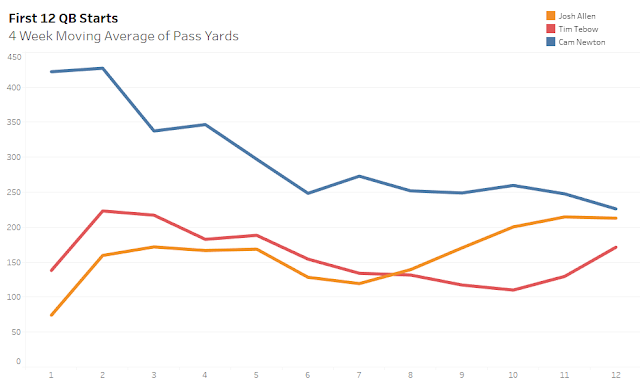
Photo Credit: Johnny Newbern/Sam Fife
Conclusion
Comparisons of Allen to Tebow seem lazy and unfair. Allen needs a lot of work still with his accuracy, but he is already a much better passer than Tebow. Their throwing motions alone can tell you that. Allen certainly needs to improve his accuracy on intermediate throws, but he’s light years ahead of where Tebow was at the same time in his respective career. I also don’t believe that the injury risk criticism has merit. Allen ran the ball often during his rookie year, but his lone injury came from a hit taken while in the pocket, which could’ve happened to anyone. While the risk of his being injured while running are increased, they shouldn’t be a significant increase compared to that of the average quarterback.
When you look at Allen’s rookie stats from a fantasy perspective, he was inconsistent week to week as most rookies are, but he also showed that his ceiling is sky-high. His lower outlier games decreased as the season progressed, and I think that we can expect that to continue, especially with a fairly high weekly floor due to his rushing output. Here is how Allen compared to the other NFL starting quarterbacks on a week-to-week basis.
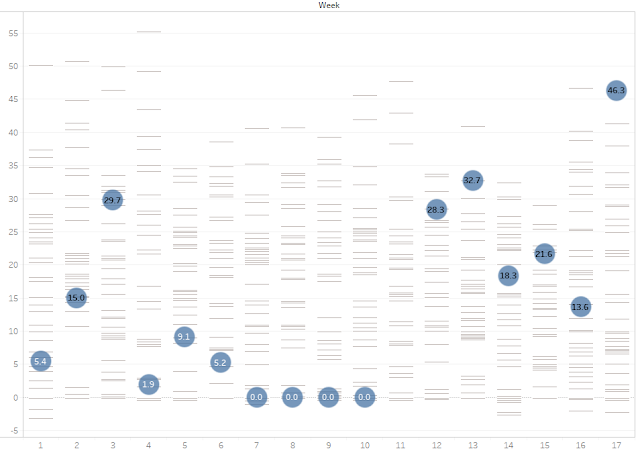
Photo Credit: Johnny Newbern/Sam Fife
As you can see, he was a fairly reliable fantasy quarterback from Week 12 on, and when you compare Allen to the other rookies in his class, he holds up. When analyzing their fantasy points from yardage versus points from touchdowns, Allen’s rookie stats show that his scoring was very not touchdown-dependent, and therefore less likely to regress, at least in that regard.
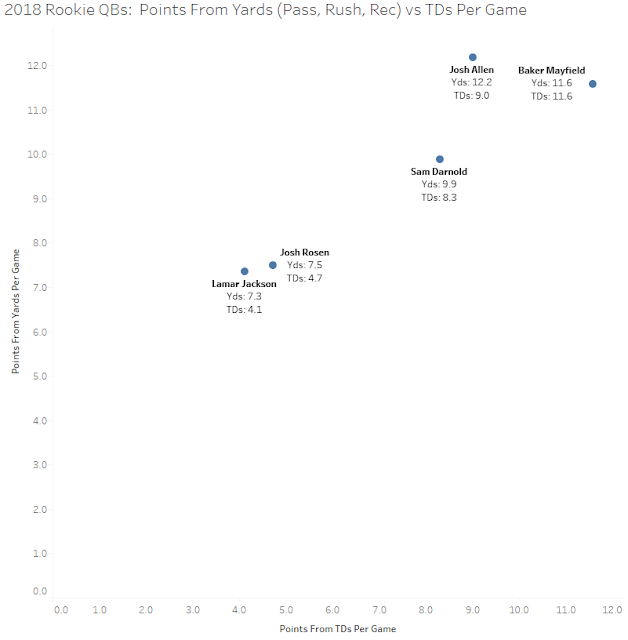
Credit: Johnny Newbern/Sam Fife
In fact, these numbers improved for Allen as the season progressed, with his stats outclassing even those of Mayfield if we’re only looking at the second half of the 2018 season.
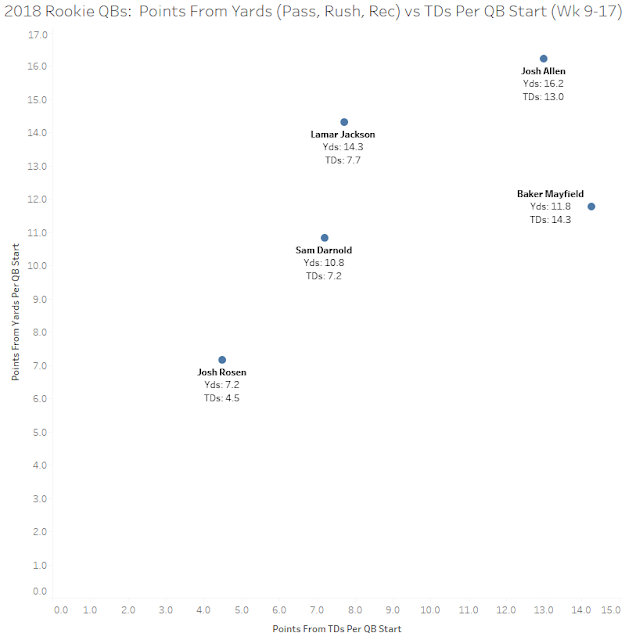
Credit: Johnny Newbern/Sam Fife
Am I buying Allen right now in dynasty leagues? You bet. His arrow is pointing up, and I think that his ceiling is far higher than most are projecting right now. From a fantasy perspective, I like him better than any other quarterback in the 2018 rookie class not named Mayfield. I am excited to see what moves Buffalo is going to make to improve his surrounding offensive talent and how much better Allen can play given another full offseason and of NFL coaching. From what I’ve seen so far, I would project Allen’s career to play out far more like that of Newton, and not so much like Tebow’s. I would expect Allen to finish at least as a top-15 fantasy quarterback next season barring injury, possibly even better as he continues to grow as a passer.
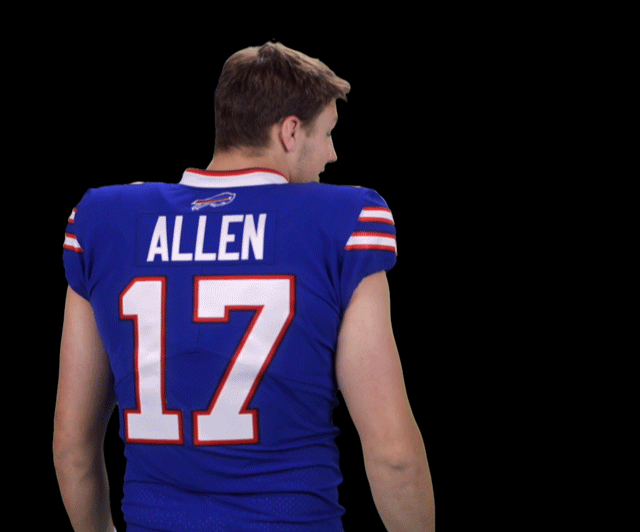
Photo Credit: gify.com


